#Republicans against Trumpism
Text
Donald Trump was slammed for another round of threats and incitement Saturday after evoking last year’s Jan. 6 insurrection — and then telling his followers it’s now time for the FBI and Justice Department “thugs” to be “dealt with.”
Critics considered the threatening messages to be a clear dog whistle to his followers, many of whom are armed. Some 62% of gun owners voted for Trump in the 2016 election. And his Oath Keeper supporters had a “massive stockpile” of weapons stashed in the Washington, D.C., area last Jan. 6 to support Trump in the event he tried to seize control of the government and remain in power, according to trial evidence.
Trump baselessly insisted in a Truth Social post that the FBI was “absolutely” involved in a “coordinated effort to change election results” to make him a loser. That justified last year’s violent Jan. 6 “protest” at the U.S. Capitol, he insisted, even though nearly 1,000 rioters have been indicted for crimes related to the insurrection that day.

Now, Trump is urging his followers on Truth Social that the “weaponized thugs and tyrants” in the FBI and DOJ “must be dealt with.”

Trump supporters on Truth Social responded by blasting the FBI as the “gestapo” and members of “organized crime,” which could put agents lives in jeopardy among Trump acolytes.
Conde Nast legal affairs editor Luke Zaleski called Trump’s brutal message the “exact speech he gave on Jan. 6.”
“He’s continuing the rhetoric that incites violence against the United States and his thugs know what ‘must be dealt with’ means,” Zaleski tweeted.

The group “Republicans against Trumpism” urged readers in a tweet to imagine the outraged response had former President Barack Obama called on his followers to take action against the DOJ and FBI.
Critics believe Trump’s vile attacks reveal how terrified the former president is about the looming prospect of criminal indictments against him. The House Jan. 6th committee is considering making at least three criminal referrals against Trump to the Justice Department, including incitement of insurrection, obstruction and conspiracy to defraud the United States government.


#us politics#news#huffington post#2022#donald trump#capitol riot#capitol riot investigation#criminal referrals#department of justice#fbi#truth social#Luke Zaleski#Republicans against Trumpism#house select committee#@SyimonTemplar#@Jane57Lisa#inciting violence#inciting an insurrection#twitter#tweet
20 notes
·
View notes
Text
The 370-page border bill that Democrats signed off on reads like a GOP wish list. Perhaps that’s because Republicans helped write the bill (though many of them promptly turned around and helped tank it after Donald Trump announced his opposition). Among its provisions: $8 billion in emergency funding for ICE, including $3 billion to increase detentions; a mechanism to “shut down” the border if a certain number of people cross; $7 billion in emergency funding for Customs and Border Protection; and a continuation of Trump’s border wall. A few progressive-sounding add-ons aside, like freeing up a limited number of new visas and hiring some more lawyers, the legislation is a complete concession to the worst aspects of Trumpism that Biden and Democrats purportedly ran against in 2020.
How do Democrats justify this lurch toward increased brutality at the border? Some appear to view it as a clever maneuver to beat the GOP at their own game. By adopting Republican framing and policy on immigration, and still getting rebuffed, this thinking goes, Democrats will show voters that Trump-driven hysteria is to blame for the supposed “crisis” at the border. It’s a confounding and amoral “gotcha” strategy, in which people seeking to move across the border in pursuit of safety, work, and a new home amount to little more than a mechanism for media narrative point-scoring.
[...]
Do Democrats now agree with the Republican party on immigration, ideologically? Their outward messaging appears to accept the premise that this hard-right bill will “fix the border” (whatever this means), so it seems they do. Top Democratic senators are proudly boosting an endorsement of the bill by the Border Patrol union, a far-right union with a history of promoting white nationalism and avidly backing Trump. MSNBC personality Al Sharpton, much to the right-wing media’s gratification, said in an interview with Senator Chris Murphy (D-Conn.) Tuesday that “we’re looking every day at the invasion of migrants”—positively Trumpian rhetoric. This seems like quite a pivot after Democratic party messaging ran in 2020 on criticizing Trump’s border policies and rhetoric as akin to Nazism. If so, do the Democrats now owe the GOP an apology?
Or, do Democrats not really think these far-right policies are good, but are simply “calling Republicans’ bluff” to prove some broader meta-point? And if so, isn’t it quite a gamble to risk the immigration status of millions and stoke nativist fears to get some cutesy hypocrisy gotcha over on the Republicans? If Democrats can, seemingly overnight, radically alter their position on immigration from one that at least pretended to pay lip service to the humanity of those seeking a better life in the US to nonstop tough-guy posturing about “harsh,” “strict,” “tough” “border security,” then what message does this send to other vulnerable groups?
161 notes
·
View notes
Text
The former Republican David French does a good job of explaining what keeps MAGA folks continuing to support Trump. It's all about the "culture" of MAGA and the sense of "belonging," combined with years of propaganda that have painted anyone even slightly on the left as being "bad" and "out to get" conservatives and their families.
And if we don't understand that, we won't know how to combat it. Here are some excerpts:
I live in Tennessee outside Nashville, a very deep-red part of America. According to a New York Times tool that calculates the political composition of a community, only 15 percent of my neighbors are Democrats. I’ve been living here in the heart of MAGA country since Donald Trump came down the escalator. This is the world of my friends, my neighbors and many members of my family. That is perhaps why, when I’m asked what things are like now, eight years into the Trump era, I have a ready answer: Everything is normal until, suddenly, it’s not. And unless we can understand what’s normal and what’s not, we can’t truly understand why Trumpism endures.
[...]
It’s no coincidence that one of the most enduring cultural symbols of Trump’s 2020 campaign was the boat parade. To form battle lines behind Trump, the one man they believe can save America from total destruction, thousands of supporters in several states got in their MasterCrafts and had giant open-air water parties.
Or take the Trump rally, the signature event of this political era. If you follow the rallies via Twitter or mainstream newscasts, you see the anger, but you miss the fun. When I was writing for The Dispatch, one of the best pieces we published was a report by Andrew Egger in 2020 about the “Front Row Joes,” the Trump superfans who follow Trump from rally to rally the way some people used to follow the Grateful Dead. Egger described the Trump rally perfectly: “For enthusiasts, Trump rallies aren’t just a way to see a favorite politician up close. They are major life events: festive opportunities to get together with like-minded folks and just go crazy about America and all the winning the Trump administration’s doing.”
[See more below the cut]
[...]
Why do none of your arguments against Trump penetrate this mind-set? The Trumpists have an easy answer: You’re horrible, and no one should listen to horrible people. Why were Trumpists so vulnerable to insane stolen-election theories? Because they know that you’re horrible and that horrible people are capable of anything, including stealing an election.
At the same time, their own joy and camaraderie insulates them against external critiques that focus on their anger and cruelty. Such charges ring hollow to Trump supporters, who can see firsthand the internal friendliness and good cheer that they experience when they get together with one another. They don’t feel angry — at least not most of the time. They are good, likable people who’ve just been provoked by a distant and alien “left” that many of them have never meaningfully encountered firsthand.
Indeed, while countless gallons of ink have been spilled analyzing the MAGA movement’s rage, far too little has been spilled discussing its joy.
Once you understand both dynamics, however, so much about the present moment makes clearer sense, including the dynamics of the Republican primary. Ron DeSantis, for example, channels all the rage of Trumpism and none of the joy. With relentless, grim determination he fights the left with every tool of government at his disposal. But can he lead stadiums full of people in an awkward dance to “Y.MC.A.” by the Village People? Will he be the subject of countless over-the-top memes and posters celebrating him as some kind of godlike, muscular superhero?
[...]
Trump’s fans, by contrast, don’t understand the effects of [the MAGA] fury because they mainly experience the joy. For them, the MAGA community is kind and welcoming. For them, supporting Trump is fun. Moreover, the MAGA movement is heavily clustered in the South, and Southerners see themselves as the nicest people in America. It feels false to them to be called “mean” or “cruel.” Cruel? No chance. In their minds, they’re the same people they’ve always been — it’s just that they finally understand how bad you are. And by “you,” again, they often mean the caricatures of people they’ve never met.
In fact, they often don’t even know about the excesses of the Trump movement. Many of them will never know that their progressive neighbors have faced threats and intimidation. And even when they do see the movement at its worst, they can’t quite believe it. So Jan. 6 was a false flag. Or it was a “fedsurrection.” It couldn’t have really been a violent attempt to overthrow the elected government, because they know these people, or people like them, and they’re mostly good folks. It had to be a mistake, or an exaggeration, or a trick or a few bad apples. The real crime was the stolen election.
It’s the combination of anger and joy that makes the MAGA enthusiasm so hard to break but also limits its breadth.
[...]
The battle and the booze cruise both give MAGA devotees a sense of belonging. They see a country that’s changing around them and they are uncertain about their place in it. But they know they have a place at a Trump rally, surrounded by others — overwhelmingly white, many evangelical — who feel the same way they do.
[...]
During the Trump years, I’ve received countless email messages from distraught readers that echo a similar theme: My father (or mother or uncle or cousin) is lost to MAGA. They can seem normal, but they’re not, at least not any longer. It’s hard for me to know what to say in response, but one thing is clear: You can’t replace something with nothing. And until we fully understand what that “something” is — and that it includes not only passionate anger but also very real joy and a deep sense of belonging — then our efforts to persuade are doomed to fail.
#maga america#rage and joy#understanding trump's appeal to his base#donald trump#gop#david french#the new york times
86 notes
·
View notes
Text



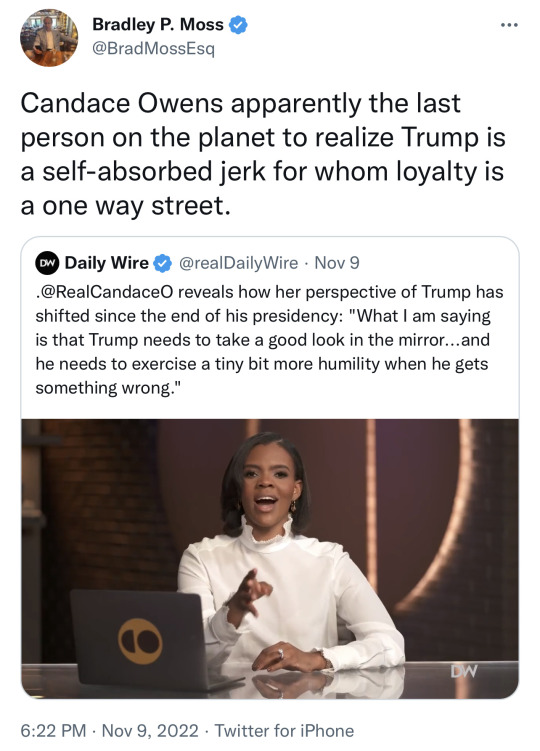
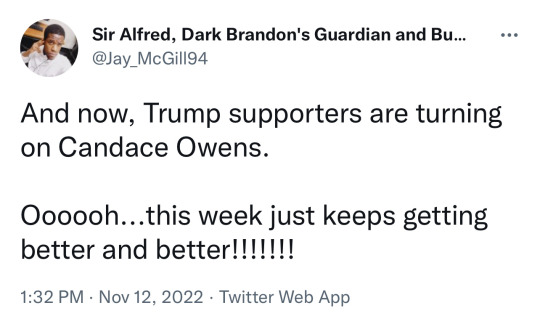



Lmao, if Candace Owens - one of the most reliable conservative “Black” friend sellouts - is publicly turning against Trump, then Rupert Murdoch and the GOP have officially washed their hands of him (but not trumpism). We are about to see the Republican Party go all in for Ron DeSantis, arguably the more dangerous Trump2.0 who doesn’t say all the racist parts aloud.
183 notes
·
View notes
Quote
Never in Oath and Honor does Liz Cheney admit that Trump’s following is a Frankenstein’s monster that her Republican Party built to win elections, a monster that then turned against it. Kudos to her for realizing how dangerous it has become and doing the best she can to fight it; she has made and is making a genuine contribution to beating back Trumpism... But this understanding has come awfully late. If only she and the rest of her party had woken up sooner.
Liz Cheney’s memoir, Oath and Honor, reviewed by Laura Miller in Slate
15 notes
·
View notes
Text
Zack Beauchamp at Vox:
“Are we a country that looks out for each other ... or do you go down a path of amplifying anger, division and fear?”
That’s how Canadian Prime Minister Justin Trudeau described the stakes in his country’s upcoming election in an interview with Vox’s Today, Explained this week — outlining the 2025 contest as no ordinary election but a referendum on the very soul of Canada.
This existential framing is an unsubtle shot at Trudeau’s rival, Conservative Party leader Pierre Poilievre, a populist firebrand who is currently outpolling the prime minister by a wide margin. Poilievre rose to party leadership as a champion of the extremist trucker convoy that occupied Ottawa in January 2022, and since then has regularly pandered to far-right voters. He has proposed defunding the CBC (Canada’s widely respected public broadcaster) and repeatedly promoted a conspiracy theory in which Trudeau is in league with the World Economic Forum.
There’s a reason that Trudeau and many others have directly linked Poilievre to Trump: His political style practically invites it. But how accurate is the comparison? Is Canada really poised to be the next Western country to fall to the far-right populist global wave?
The answer, as best as I can tell, is mixed.
It’s true that, by Canadian standards, Poilievre is an especially hard-nosed figure, one far more willing to use extreme rhetoric and attack political opponents in harsh terms.
But on policy substance, he’s actually considerably more moderate than Trump or European radicals. Mostly eschewing the demagogic focus on culture and immigration that defines the new global far right, Poilievre is primarily concerned with classic conservative themes of limited government. His biggest campaign promises at present aren’t slashing immigration rates or cracking down on crime, but building more housing and repealing Canada’s carbon tax.
Poilievre is basically just a conventional Canadian conservative who wraps up his elite-friendly agenda in anti-elite language aimed at working-class voters. He’s the kind of politician that some Republicans wish Donald Trump was: a tame populist.
Understanding Poilievre isn’t just of interest to Canadians. There are reasons that his brand of populism is less virulent than what’s cropped up in many other Atlantic democracies — ones that hold important lessons for safeguarding democracy around the world.
Why Pierre Poilievre doesn’t fit the far-right script
The University of Georgia’s Cas Mudde, one of the leading scholars of the European right, has developed what is (to my mind) the most useful definition of radical right politics today. In his account, this party family — factions like Hungary’s Fidesz, France’s National Rally, and the US GOP — share three essential qualities.
First, they are nativist; they strongly oppose immigration and multiculturalism. Second, they are willing to use aggressive, even authoritarian measures to deal with social disorder like undocumented migration and crime. Finally, they are populist, meaning that they define politics as a struggle between a virtuous people and a corrupt elite.
Poilievre is certainly a populist. A right-wing operative and politician since he was a teenager, he rocketed to the top of the Conservative Party hierarchy after emerging as the most vocal champion of the 2022 Ottawa occupation. The uprising, which began against pandemic restrictions but swiftly became a broader far-right movement, was quite unpopular nationally. But inside the Conservative Party, there was enough support for its “pro-freedom” message that Poilievre rode his pro-convoy stance to victory in the party’s subsequent leadership election.
Since then, his populism has focused relentlessly on attacking the media, “globalists,” and (above all) Trudeau. Casting the fight between his Conservatives and Trudeau’s Liberals as the “have-nots” versus the “have-yachts,” he has argued that the prime minister embodies a debased Ottawa establishment out of touch with the needs and values of ordinary Canadians.
In a recent speech, Poilievre cast Trudeau as an “elitist” leader gunning for Canada’s freedoms. “If he had read Nineteen Eighty-Four, he would have thought it was an instruction manual,” Poilievre argued.
Somewhat ironically, Poilievre also believes Canada’s criminal justice system should be harsher. Blaming Trudeau for a recent rise in car thefts, Poilievre has argued for a reimposition of mandatory minimum sentences and other tough-on-crime policies. This means there’s at least a case that he also fits the second prong of Mudde’s definition of radical right politics.
But on the first prong, nativism, Poilievre clearly diverges from Trump and the European far right. He has publicly insisted that “the Conservative party is pro-immigration,” and he has made appealing directly to immigrants a central part of his campaign strategy.
[...]
Arising primarily in Western provinces (Manitoba, Saskatchewan, and Poilievre’s native Alberta), Canadian “prairie populism” historically draws strength from the notion that the federal government cares more about the population centers in Quebec and Ontario than the rest of the country. Prairie populism, which comes in left- and right-wing varieties, focuses far more on regional and economic issues than the cultural obsessions of the modern far right.
“We have had a long history of populism — particularly in the prairie provinces, the Western provinces — going back to the 1920s and 30s,” says Keith Banting, a professor at Queen’s University in Ontario. “Populism draws less extensively on anti-immigrant sentiment in Canada than it does almost anywhere else.”
Indeed, Poilievre’s biggest focus is cost-of-living issues — blaming ordinary people’s economic pain on high taxes and big government. His signature proposals are repealing Trudeau’s carbon tax, cutting spending to fight inflation, and removing restrictions on housing construction.
[...]
Poilievre’s “plutocratic populism”
While Poilievre is a very Canadian figure, fitting solidly into the right-wing prairie populist tradition, his politics also have a lot in common with a concept developed for the United States: political scientists Jacob Hacker and Paul Pierson’s “plutocratic populism.”
In their book Let Them Eat Tweets, Hacker and Pierson argue that the Republican Party uses culture war as a vehicle to attract popular support for a party that primarily caters to the interests of the rich. This strategy of “exploiting white identity to defend wealth inequality” allowed Trump’s GOP to attract downscale, non-college-educated voters without abandoning its core commitment to tax cuts and deregulation.
But in the United States, the populists ate the plutocrats. Trump’s anti-democratic instability and economic heterodoxy on issues like trade led some GOP billionaires, like the Koch family, to try and unseat him in the 2024 primary. They failed miserably and now are slinking back. In the Republican Party, MAGA is calling the shots.
Poilievre, by contrast, keeps his populism within plutocrat-acceptable bounds. His rhetorical gestures toward the working class are paired with solidly pro-rich policy views and a distinct absence of attacks on the democratic system itself.
In 2013, he claimed to be “the first federal politician to make a dedicated push” toward imposing US-style right-to-work laws in Canada. He has endorsed tax cuts for the rich and cuts to social spending. His trade policy is far more free-market than Trump’s. There are no signs that he would challenge the legitimacy of Canadian elections, let alone stage a January 6-style insurrection.
Vox reports on Conservative Party of Canada leader Pierre Poilievre's brand of right-wing populism is tamer than Donald Trump, Viktor Orbán, or Marine Le Pen's.
4 notes
·
View notes
Text
It would have been better for Ukraine if Kyiv had fallen in February 2022, when Putin first sent his forces in, than for Western perfidy to grant Russia victory now.
Tens of thousands of Ukrainian soldiers have died. (The Ukrainian government does not release figures but reliable estimates of the size of the butcher’s bill range from 30,000 to 80,000.) Then there are the civilian deaths from the bombing, the murders and rapes in occupied Ukraine, and the ecological catastrophe caused by the destruction of the Kakhovka Dam.
All that pain, all that blood, all for nothing,
The betrayal will be the worst of it. The West would have promised to stand by its ally and then broken its word and abandoned its friends.
Historians will spend decades examining the motives of US right-wingers if Donald Trump succeeds in persuading them to cut aid to Ukraine.
They will want to find rational reasons for the betrayal as rational people like to do.
And to be fair, there will be rationally explicable reasons. When US Senators say that their voters don’t want them to send money to Ukraine, and prefer to deal with problems closer to home, they make sense.
Voters always object to spending blood and treasure on foreign causes, and supporters of overseas aid should never assume that their arguments will triumph.
But rational explanations on their own cannot explain the behaviour of the US right. A dark and malignant hatred of democracy drives them, and we should not underestimate its power.
The quote I always reach for when I find myself in danger of not taking malice and madness seriously enough came from the historian Norman Cohn. He looked at the Protocols of the Elders of Zion, the forged document that inspired Nazism by detailing an imaginary Jewish conspiracy.
You could not understand Europe’s descent into with fascism with purely rational explanations.
Instead, Cohn concluded
“There exists a subterranean world where pathological fantasies disguised as ideas are churned out by crooks and half-educated fanatics for the benefit of the ignorant and superstitious. There are times when this underworld emerges from the depths and suddenly fascinates, captures and dominates multitudes of usually sane and responsible people.”
What else is Trumpism but a movement of the crooks and half-educated fanatics that has captured American Conservatism?
Ukraine is its enemy because, when he was president, Trump tried to persuade Volodymyr Zelensky to investigate a fake allegation that Joe Biden had pressured Ukraine into dropping an inquiry into his son Hunter Biden’s lobbying.
True to his mafia boss character, Trump threatened military aid to Ukraine if Zelensky did not cooperate. There was no evidence that Joe Biden took any action to intentionally benefit his son. To his credit Zelensky refused to agree to set-up Biden, and right-wing America hated him for that.
They hated it too when Democrats tried to impeach Trump for soliciting the help of a foreign country to smear a rival. And I should note in passing here that the supposed isolationists of the Republican party are very keen on foreign entanglements when they provide opportunities for political and financial corruption.
As a result, the pathological fantasies of MAGA world include a hatred of Ukraine, which like so many of the calumnies of the far right (and left) include elements of almost sexual disgust.
Readers who hope for rational explanations should try to explain away Tucker Carlson. Before he flew to Moscow to interview Putin on bended knee, Carlson described Zelensky as being like a “manager of a strip club demanding money”. From what dark closet in his mind, did that strip club come from?
Others described Zelensky as a “welfare queen” or discussed how they wanted to “punch him in the face”.
Republicans are punishing Ukraine for refusing to go along with Trump’s schemes against his rival. Their partisan hatreds are so extreme that anyone who does not do down Biden must be their enemy.
But the malice runs deeper than mere partisanship. Vladimir Putin is explicitly in the mental world of the counter-Enlightenment.
He showed it towards the end of Carlson’s interview, when he turned sentimental, and not only out of gratitude for the easy ride his Quisling questioner offered.
Russians were more natural and less alienated from God and nature than soulless materialistic westerners, Putin said.
“It is in the heart,” the dictator explained. “Our culture is so human-oriented. Dostoevsky, who is very well known in the West as the genius of Russian culture, spoke a lot about this, about the Russian soul…Russian people think more about the eternal, about moral values.”
The eternally moral Russian people are now on Putin’s orders engaged in mass murder, rape, and the abduction of Ukrainian children in an illegal invasion of a sovereign democratic state.
The easy thing to say in these circumstances is that Putin is as great a hypocrite as the evangelical Christians who worship Donald Trump, even though he is intimate with all of the seven deadly sins, and would discover the eighth and the ninth if they were there to find.
But sentimentality is often on reverse side of barbarism’s coin. Like a gangster who loves his dear old mother, Russian nationalism has always combined sickly praise for the Russian soul with the utmost brutality.
Putin was endorsing the sentimentality and barbarity of the 19th century Slavophile movement.
It saw Russians as a pure people uncorrupted by modernity. For Dostoyevsky the most vulgar Russian peasant was better than an intellectual because the peasant feared God.
Meanwhile Tolstoy believed that simple Russians were “less intellectually corrupted” than Westerners. They will “understand at last where the means of salvation lie and will be the first to begin to apply it.”
Quoting Tolstoy and Dostoevsky may seem benign. Who does not occasionally think that the honest peasant knows more than the pretentious intellectual?
In Russia’s case the Slavophile myth of the virtuous Russian soul allowed first the Tsars in the 19th century and now Putin to justify the suppression of democracy. Free societies and human rights were corrupt western imports that would only spoil Russians.
The Protocols of the Elders of Zion and the other early fascist conspiracy theories, which Norman Cohn studied, did not come from Nazi Germany but from Tsarist Russia. Their central propaganda message was that Western democracy, rights, liberties and freedoms were shams that hid a conspiracy of the real rulers of the world.
In the case of tsarism and fascism, and today some versions of Islamism and far leftism, it is a conspiracy of Jews.
In the case of Donald Trump and the Republicans it is a conspiracy of Democrats rigging ballot machines.
In the case of Putin, it is a conspiracy of Western deviants.
As Ian Garner and other scholars have emphasised, the Putin regime now uses homophobia as the Nazis used antisemitism.
For instance, speaking in the Kremlin last year Putin began by denying that Ukraine was a democracy. True to fascist form he said that its “real masters” lay in the “dictatorship of the Western elites”.
These elites were engaged in a “complete denial of humanity [and] the overthrow of faith and traditional values.” They wanted nothing less than “outright satanism.” And the satanism of the West manifests itself in its sexual diversity. Putin would not allow “here, in our country, in Russia, instead of 'mum' and 'dad', to have 'parent No. 1', 'parent No. 2', 'No. 3'?
The American right, of course, is keener on fighting the war on the woke than winning the war in Ukraine.
Get down into the subterranean world and an alliance between Republicans and Russian nationalists can now make sense.
Neither believes in democracy.
Both see it as a sham that hides the influence of the puppet masters who rig elections and control society.
And finally, both think they have a God-given right to rule, quite literally so. Trump’s evangelical base is theocratic rather than democratic, while Putin rules with the blessing of Russian Orthodox church.
Who guessed even 10 years ago that these criminals and fanatics from the sewers of politics would control our future?
But control it they do, and it will take a superhuman effort to rid ourselves of them.
7 notes
·
View notes
Text
youtube
Rick Wilson describes why MAGA supporters are so addicted to Trump.
He's an anti-Trump Republican strategist who says that he will do whatever it takes to get Joe Biden re-elected.
Trump needs to be defeated as hugely as possible, but the Electoral College makes that difficult. We should be prepared to give condensed civics lessons to people we know who speak indulgently about third parties. Reticence is for losers.
We are in for years of struggle against the far right. Liberals and moderates need to show as much long term commitment to burying Trumpism as the fundamentalist right did in their 49 year effort to overturn Roe v. Wade.
Ultimately, the United States belongs to those with the longest attention spans.
#donald trump#maga zombies#republicans#the gop#gop presidential nomination#election 2024#rick wilson#ines pohl#Youtube
12 notes
·
View notes
Quote
Prevention of the re-imposition of New Deal rentier repression has long been a priority of both US political parties. Right-wing populism is just one inchoate reflex against financialization’s street-level consequences. The “establishment Republicans” are still committed to the rentier class, or what’s left of establishment Republicans after Trumpism. Likewise, the toothless, gerontocratic Democratic and Labor parties (now tactically “woke”) still carry water for finance capital, too.
Stan Goff
4 notes
·
View notes
Note
Im going to an event held by politics and prose cassidy hutchinson "on conversation: wirh jamie raskin. I read "enough" but im so conflicted about her. She was put in a position which was to me both a total no-brainer and incredibly difficult, but im also like. PEOPLE DIED, CASSIDY!!!!!! thoughts?
Yeah I have the same double mind. Cassidy Hutchinson clearly doesn't have a problem with Republican policies or even Trump himself pre January 6, she just doesn't support overthrowing democracy.
The key thing to me about Trump 2024 is that almost all his staff and cabinet and advisors came out against him! He burned a lot of bridges and nobody wants to be associated with him! Paul Ryan even called himself a Never Again Trump Republican. Part of this is because they realized that Trumpism loses at the ballot box while normal Republicans do well, but also, I think that among Republican elites, even if they don't say it out loud for fear of retribution.
College educated Republicans really hate that Trump's white trash army tried to overthrow the government since these people absolutely think that Trump's biggest fans are crass and dirty basically. It's high key classism but as someone who's pro-democracy, I'll take a fickle ally over an outright enemy.
Does that make sense?
9 notes
·
View notes
Text
This week, Senate Democrats and the White House took a sudden—and, by their own admission, rightward—turn on immigration, angering immigrant rights activists and throwing out years of liberal rhetoric and policy perspectives they had, at least in theory, claimed to support.
The 370-page border bill that Democrats signed off on reads like a GOP wish list. Perhaps that’s because Republicans helped write the bill (though many of them promptly turned around and helped tank it after Donald Trump announced his opposition). Among its provisions: $8 billion in emergency funding for ICE, including $3 billion to increase detentions; a mechanism to “shut down” the border if a certain number of people cross; $7 billion in emergency funding for Customs and Border Protection; and a continuation of Trump’s border wall. A few progressive-sounding add-ons aside, like freeing up a limited number of new visas and hiring some more lawyers, the legislation is a complete concession to the worst aspects of Trumpism that Biden and Democrats purportedly ran against in 2020.
8 Feb 20
3 notes
·
View notes
Photo


In the New York Magazine article, “The Future of Trumpism: The greatest threat to Donald Trump’s hold on the GOP comes from Ron DeSantis, who may be more MAGA than the MAGA king himself,” Jonathan Chait discusses some of Ron DeSantis’s more disturbing beliefs about the U.S. Constitution and wealth.
Basically, DeSantis seems to believe that the Constitution was designed to protect elite wealth from being redistributed to the working classes. If DeSantis were to be elected president, there’s a good chance he would try to undo every progressive social safety net program we have created since the New Deal, including Social Security, Medicare, Medicaid, the ACA, SNAP, and TANF.
Below are some excerpts from DeSantis’s 2011 book Dreams From Our Founding Fathers: First principles in the age of Obama:
[Benjamin] Franklin and other Founding Fathers believed that respect for individual property rights was the sine qua non of a free society, and regarded the so-called “leveling spirit,” which seeks to equalize property through government action, as a danger that American institutions needed to check…. How to craft a government based on popular consent that did not devolve into popular majorities voting themselves the property of others was one of the main concerns for Madison and his colleagues at the Constitutional Convention.
[...]
Madison pulled no punches about specifying the particular types of faction that a republican form of government needed to guard against. “A rage for paper money, for an abolition of debts, for an equal division of property, or for any other improper or wicked project”…. Madison…also viewed these “wicked projects” as inimical to fundamental notions of justice and individual liberty. As a matter of first principle, the republic needed to be constructed to prevent such projects from ever coming into being.
[emphasis added]
--Ron DeSantis (2011, pp. 123, 128-129)
If Ron DeSantis wins the White House in 2024 and has a GOP Congress, and a Federalist Society dominated Supreme Court, he will be able to dismantle the social safety net in the U.S. with impunity. We cannot let that happen.

[edited]
____________________
Ron DeSantis Photo-Illustration: Eddie Guy & Photo: Joe Raedle/Getty Images (before edits & title caption); Maya Angelou quote image source (before edits & a newer version of Maya Angelou’s signature)
#ron desantis#dreams from our founding fathers#us constitution#protection of wealth#neofascism#jonathan chait#new york magazine#intelligencer#my edits
183 notes
·
View notes
Text
Congressman Mark Pocan (D-WI) has laid out a path forward for LGBTQ+ equality, which prioritizes defeating Donald Trump in November and pushing the right’s more extreme elements out of the mainstream Republican party. Americans can be convinced to support LGBTQ+ rights, but Trumpism — or, in Pocan’s words, “that hate, base-only mentality” — must be divorced from the Republican party.
Because, outside the most right-wing parts of the GOP base, there isn’t much support for lawmakers spending so much time attacking LGBTQ+ rights.
I truly believe it was the last spaghetti thrown against the wall,” the congressman told LGBTQ Nation when asked about Donald Trump’s use of transphobia at his rallies — including one last year where Trump attacked “transgender insanity” before making fun of how his supporters are so energized by attacks on transgender people when they “didn’t know what the hell” transgender people were while he was in office.
“They were looking for something to scare people because that’s where they do this best,” Pocan said. “I really believe much of this issue is a driver for a segment of their base, and not a general election driver because most people — what they’re most concerned about — are kind of economic core issues to their family … I think it’s going to be hard to make this one of those transcending issues.”
They didn't know what the hell transgender people were when he was in office. Now, they use it to raise money and scare people!
“I truly believe it was the last spaghetti thrown against the wall,” the congressman told LGBTQ Nation when asked about Donald Trump’s use of transphobia at his rallies — including one last year where Trump attacked “transgender insanity” before making fun of how his supporters are so energized by attacks on transgender people when they “didn’t know what the hell” transgender people were while he was in office.
“They were looking for something to scare people because that’s what they do best, then raise political funding!”
“They were looking for something to scare people because that’s where they do this best,” Pocan said. “I really believe much of this issue is a driver for a segment of their base, and not a general election driver because most people — what they’re most concerned about — are kind of economic core issues to their family … I think it’s going to be hard to make this one of those transcending issues.”
This is in contrast to the House, where Pocan says that “LGBTQ+ discrimination is pretty rampant” right now. He brought up how House Republicans attached anti-LGBTQ+ riders to major appropriations bills throughout 2023 in defiance of congressional norms.
It’s coming back to full-blown discrimination against the broader LGBTQ+ community,
“I think it’s really broader now than just the very significant anti-trans attacks we’ve seen nationwide, but it’s coming back to full-blown discrimination against the broader LGBTQ+ community,” Pocan said. “We do have to try to gain public support and show that public support to the rest of Congress to try to make some of these attacks less common.”
Pocan chairs the Congressional Equality Caucus (CEC), which was formed in 2008 to advance LGBTQ+ rights, putting him at the center of discussions of LGBTQ+ issues in the House and giving him unique insight into how LGBTQ+ equality will fare in the House this year.
The GOP is obsessed with taking Rights away from Members Of The LGBTQI+ Community. A report that outlines how Republicans have tried to use the levers of power afforded to them in the chamber to take away rights from LGBTQ+ people.
Pocan and the CEC’s focus is on the 2024 election season. The CEC just released “Obsessed: House Republicans’ relentless attacks against the LGBTQI+ community in 2023,” a report that outlines how Republicans have tried to use the levers of power afforded to them in the chamber to take away rights from LGBTQ+ people.
The report identified 50 anti-LGBTQ+ votes held on the House floor last year, 95 anti-LGBTQ+ amendments added to bills that the House will vote on, 40 committee hearings at which people made anti-LGBTQ+ comments (often as the main focus of the hearing), and 55 anti-LGBTQ+ bills introduced. House Republicans voted to pass several anti-LGBTQ+ bills and also voted for anti-LGBTQ+ extremist Speaker Mike Johnson (R-LA) to lead the House.
This report continues in-depth at LGBTQNATION and can be found by clicking this line.
#black lives matter#aclu#black lgbt#gay#lgbtqi#lgbt#black history#gay men#gayboy#gay love#gayguy#gayman#gay couple#gay art#gayhot#gay memes#gaytwink#gay marriage#gay life#gay tv#gay asian#gay bear#gay community#gay cub#gay dad and son#gay encouragement#gay edit#gay exposure#gay fantasy#gay music
2 notes
·
View notes
Text
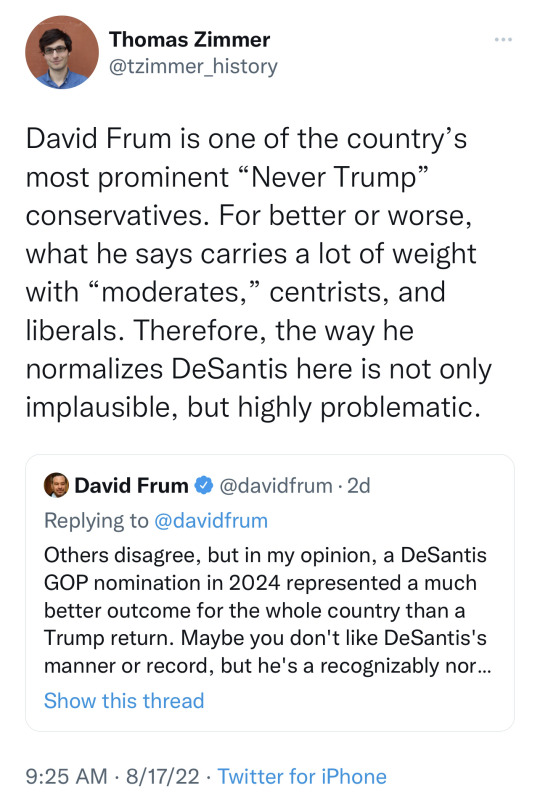
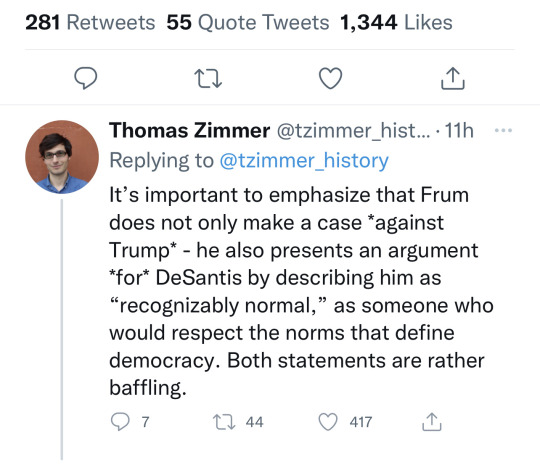
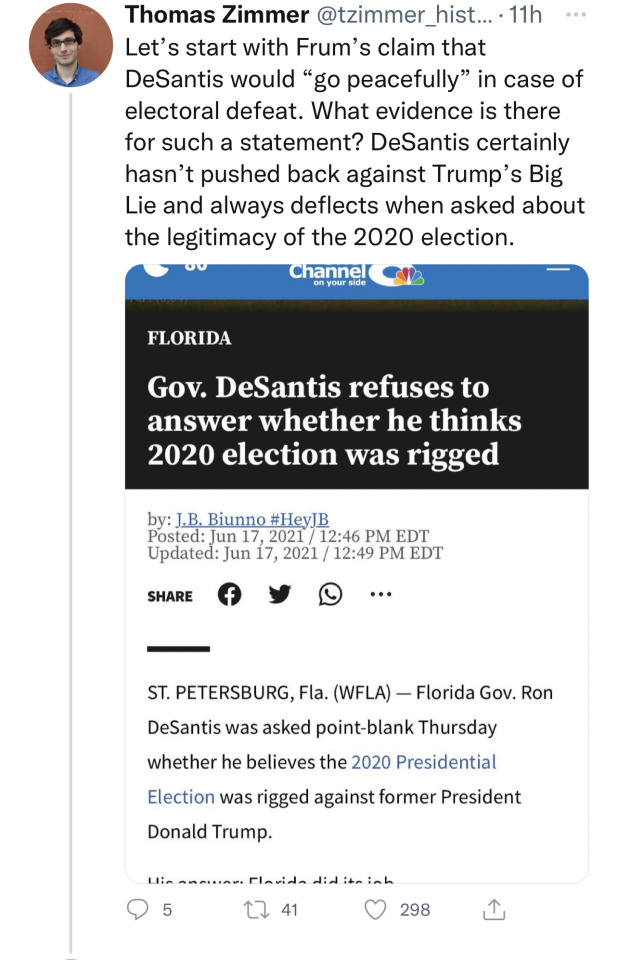
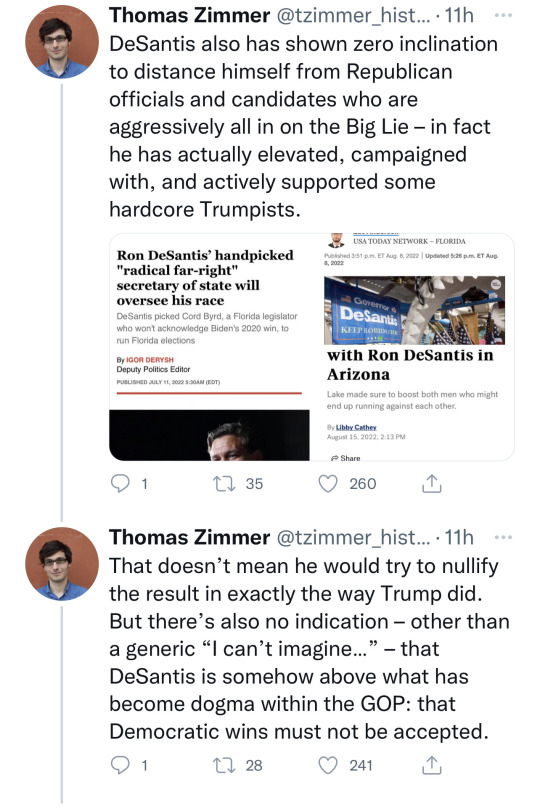
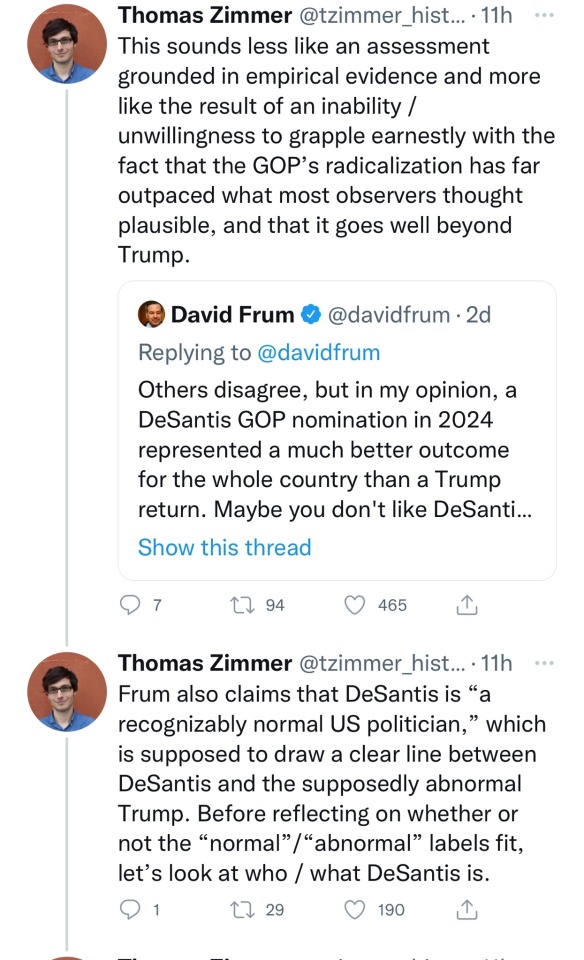

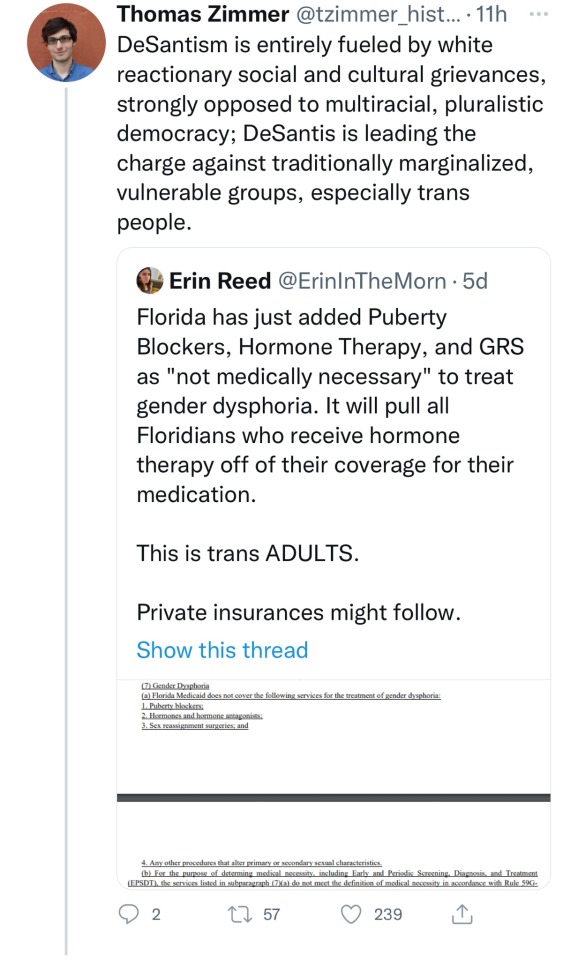
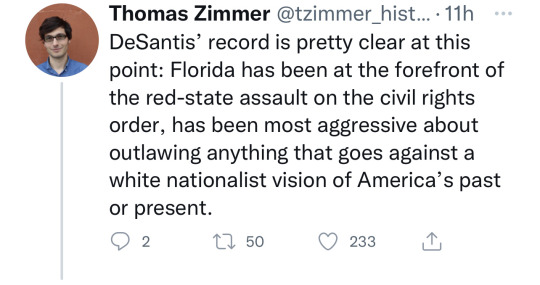
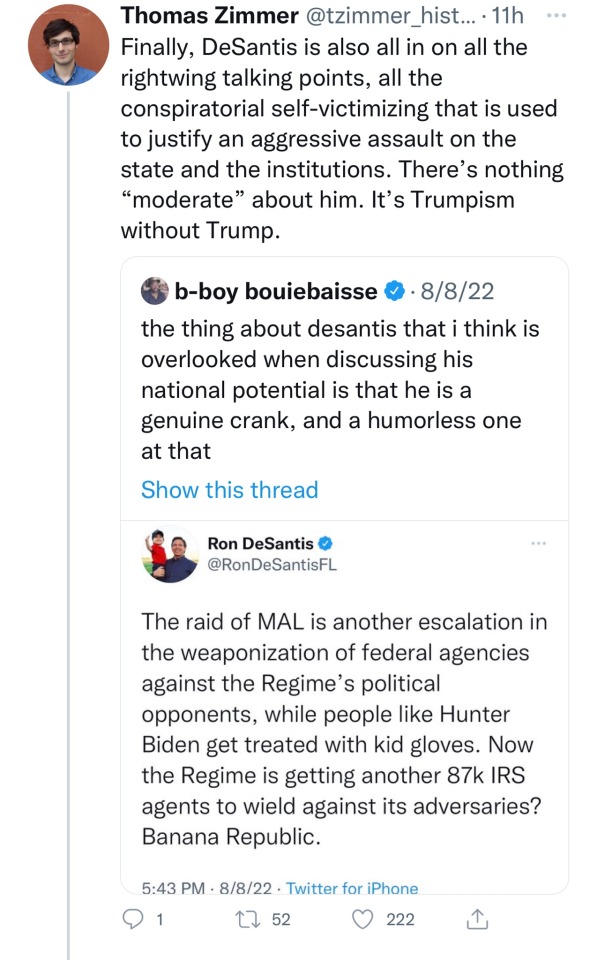
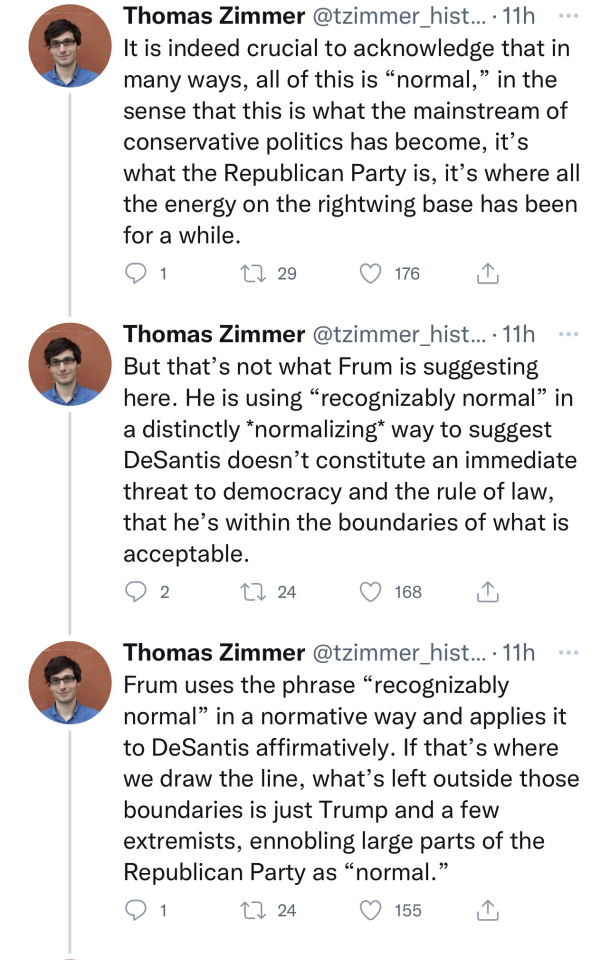
Thread continues:
“That really is the key difference: What is the message behind describing DeSantis as “normal” – “We just need to defeat Trump and the emergency is over” or “Even beyond Trump, the GOP has fully been taken over by Trumpism and the party represents an acute threat to democracy”?
The latter is a lot more plausible, empirically and historically, as it acknowledges not only the extent and depth of the GOP’s radicalization, but also the long-standing anti-democratic tendencies and impulses on the Right; it describes Trump as symptom rather than cause.
The former, however, is more attractive to all those who want to define Trump as more of an aberration, a clear departure from a supposedly venerable conservative tradition, someone who has hijacked the GOP’s noble project - a perspective that has some self-exculpatory appeal.
It’s imperative, analytically and politically, we make the case against Trump without providing cover for DeSantis, without presenting DeSantism as anything but the danger to democracy and the civil rights order it so clearly is. It didn’t start with Trump. It won’t end with him.”
David Frum is trying to position Ron DeSantis as a “normal” Republican; a “moderate” who is “reasonable” and less dangerous than Trump. The thing to remember about “Never Trump” Republicans is, they are still Republicans. Even the “good” ones still want Roe v Wade overturned. They still vote against the Voting Rights Act. They are still against most reasonable forms of gun control. They are still homophobic and transphobic. There is no such thing as a “good” Republican. Not even the ones who hate Trump. Liz Cheney, for example, voted with Trump’s policies 93% of the time while she was in office. And Liz Cheney also failed to call out Trump’s birtherism against the first Black President. Because she is a Cheney and a Republican.
I know that a lot of Reagan Democrats will fall for the okie doke, but it’s a whitewash; it’s revisionist history that leaves out all the bad (but true) parts. So whenever you start hearing political pundits start calling Cheney “the next Lincoln” or referring to DeSantis as a “moderate,” you know they’re full of shit. As always, look at the policies, not the person.
50 notes
·
View notes
Text
no fucking idea why subpar memes that seem lifted from 2011 seemed like something publishable but it's a good excuse for me to hypothesise that the gop would be caught in trump's orbit regardless of their stated agenda simply because they're caught in an incentive feedback loop between trump being a wellspring of highly potent capacity to agency (centripetal) and the threat of his maga mob-forces against internal dissent (prevents centrifuge). i remember reading an excerpt from this one interview with a rather elevated member of the republican party where he'd said how roe and goldbuggery were never supposed to be serious policies but rather fodder and kayfabe for populations of single-issue crackpots and how it's a "nightmare" or something under trump who'd actually gone that far to give those demographics what they want. paying for agency in agenda is how you become an authoritarian client. not that the gop is uncomfortable with it, ofc, it'd only taken several years to adapt, not for anything to do with any sense of ethics, but solely for a shaken sense of safety to collect itself -- the gop had likely always wanted to pull a trumpist turn but had likely been held back by a desire against the cost of risking a plush domestic status quo to do it, and so trump's greatest role was not so much in his agenda (which probably wasn't too different from the gop's own line except for how much more he was willing to drive certain things, affecting the party's ideas of what is feasible as a consequence) as much as in his ability to lead the plunge. history repeating.

2 notes
·
View notes
Text

Nick Anderson
* * * *
DeSantis drops out of GOP primary campaign.
Ron DeSantis nearly destroyed Florida in his attempt to prove that he is meaner and more extreme than Trump without the craziness of Trump. It didn’t work, as an editorial in the Miami Herald noted on Sunday evening: DeSantis was supposed to save the GOP from Trump, not endorse him
Per the Herald,
It’s not just that he was steamrolled by Donald Trump. DeSantis never appeared to want to save the GOP. He was more interested in making it a more ravenous, angrier and intolerant party. That worked for Trump, but didn’t work for the governor with all the charisma of burned toast.
So now DeSantis’ presidential campaign has ended. But the damage of the laws he has pushed through in Florida, as he landed more appearances on Fox News, will live on. Without his political ambitions, there likely wouldn’t be “Don’t say gay,” woke wars and the waste of state resources to fight meaningless battles against drag queen bars.
DeSantis has fallen in line behind other Republicans to “kiss the ring” of Trump—even though DeSantis railed against Trump sycophants only a week ago. DeSantis said,
You can be the most worthless Republican in America, but if you kiss the ring he'll say your wonderful.
Six days later, DeSantis “kissed Trump's ring” by endorsing Trump in the same announcement in which DeSantis suspended his campaign. And, on cue, Trump responded by saying “Ron” (rather than “DeSanctimonious”) was a “gracious” candidate who ran a good campaign.
There will undoubtedly be a lot of good analyses about the reasons for Ron DeSantis’s failure, and I look forward to sharing them with you. Tonight, I want to add what I see as a glimmer of hope in DeSantis’s political demise.
To begin, DeSantis was a miserable candidate because people understood he was disingenuous, cruel, and angry. Let’s agree on that fact and move on.
DeSantis fashioned himself as “Trump but competent.” Accepting that premise, the rejection of DeSantis shows that the support for Trump isn’t really about his policies (or his competency). It is about personal support for Trump. That’s good! Why? It suggests that if we can get past the latest (and last) effort by Trump to take the presidency, running on his policies is not enough to garner more than a few thousand votes in Iowa. (No disrespect to Iowa.)
This theory is discussed by Zack Beauchamp in Vox, Ron DeSantis got the Republican Party wrong. Beauchamp writes,
DeSantis was betting that Trumpism could be separated from Trump: that enough of the GOP’s radical factions wanted the right-wing populism without the chaos of the man who brought it to dominance in the party.
When Trump is finally gone, we will see a raft of Trump wannabes in the style of Ron DeSantis come to the fore—Don Jr., Mike Flynn, Matt Gaetz, etc. They will run on Trump's policies, but that won’t be enough. They are not Trump.
All of this suggests that there may be the remnant of a political movement that can rise from the ashes of the GOP to form a different, new party that sheds itself of MAGA extremism as it leaves Trump in the rear-view mirror.
The above is a bit fuzzy and inchoate, but the failure of DeSantis should be reassuring. If DeSantis gained traction and appeared as a serious contender for election in 2024, we could have been looking at another eight years of MAGA extremism in the presidency.
If we beat Trump in 2024—and we can—the Trump wannabes don’t appear to have the toxic brew that runs through Trump's veins. This is why we should do everything possible to defeat Trump at the ballot box in 2024. Doing so may foreclose the last chance for a MAGA extremist to gain the presidency.
To be sure, MAGA extremism will endure in the states and in Congress, but we will have avoided the threat to democracy of Trump (or an imitator) as president. That matters a lot.
Robert B. Hubbell Newsletter
#Robert B. Hubbell Newsletter#Robert b. Hubbell#Nick Anderson#Florida#woke#MAGA exteremism#DeSantis#chaos
5 notes
·
View notes